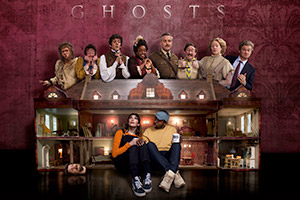Ghosts cast interview

Alison and Mike, a cash-strapped young couple struggling to buy their first home, think their prayers are answered when a distant relative bequeaths them a sprawling country estate. The catch? The old house is haunted by the ghosts of its former inhabitants.
Ghosts is written by and stars the team who started out together on Horrible Histories, and went on to create Yonderland and the feature film Bill.
Here Mathew Baynton, who plays Thomas, Simon Farnaby (Julian), Martha Howe-Douglas (Fanny), Jim Howick (Pat) Laurence Rickard (Robin, and Humphrey's head), and Ben Willbond (The Captain) explain more.
How did Ghosts come about? What's the story behind it?
Mathew: Initially we just wanted to do something together. We knew Horrible Histories was finishing and it was before Series 3 of Yonderland, which we suspected would feel like enough. We wanted to come up with another thing to do together so we hired out a room in town and threw some ideas around. I think the haunted house thing was one of the first...
Laurence: And then we rejected it, because all first ideas are terrible, so we thought there must be something else!
Mathew: We all got really excited about the idea of us playing loads of ghosts! At the time, the idea was that we would play loads of characters each, as we've always done. We came up with loads of funny images and characters, but then when it came to writing the stories we realised they don't need jobs, they don't fear death... they're already dead!
It suddenly felt like there was no jeopardy that we could write into it, so we abandoned it and went to work on an alien, sci-fi idea, which is still in progress, but then something clicked and we realised the boredom of eternity and the existential aspects of the ghosts idea was unique. The stories could be really petty! We realised it was a house-share sitcom - and as soon as you stop thinking about those kind of major drama stakes, you unlock a story that is really domestic and petty.
Laurence: All of those house-share sitcoms contain people that are in a situation they are stuck in. Ghosts is the ultimate version of that; they are stuck together for hundreds of years and none of them can leave. Then we realised by having the Mike and Alison characters that they then bring the stakes, the worries about money, life and everything you need for a story.
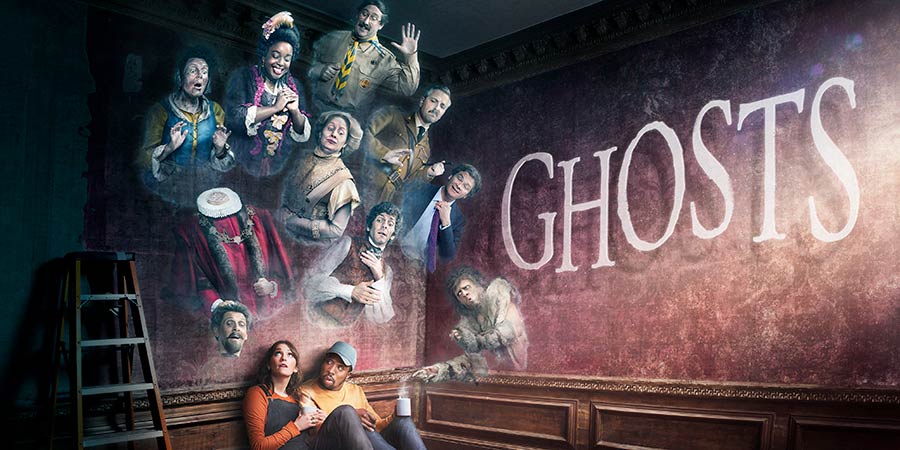
What's it like when you're all in a room, writing and discussing ideas? Is someone doing the talking and someone else writing?
Ben: We have round-table meetings. Sometimes it's quite hard because there's a lot to get through, but I think we're in a really good place now - it's delightful to sit around a table and come up with stories and characters.
Laurence: We'd always done that with Yonderland. Everything starts around the table and we'd get to a point of developing characters and individual jokes. Then we'd work out who had particularly latched on to a specific story and they would go away and write that up - some would write solo, some would write in duos. Then when we'd drafted it up, we'd take it back to the table and read it together and everyone would discuss ideas and comments.
Mathew: It's a writers' room to some extent, it's almost arbitrary who's name ends up on which episode. As Larry said, before we even go away to write it we'd have whole chunks of dialogue already. You're armed with a bag of tricks already - and then it comes back to everyone at the end and there are rewrites. There's so much cross-pollination. You sort of forget who came up with what really.
Laurence: We have so many views of the script that by the time we send them off we're certain we've done our homework, that it's all rigid. But that means that you can play around with it on the day. It's always dangerous to rely on improvisation to save something that's not quite there - we never do that, but we do allow ourselves some looseness.
Can you talk us through the different ghosts and how you decided who would be best suited to whom?
Simon: That's quite an easy one - I've got the best legs so I get to go in pants!
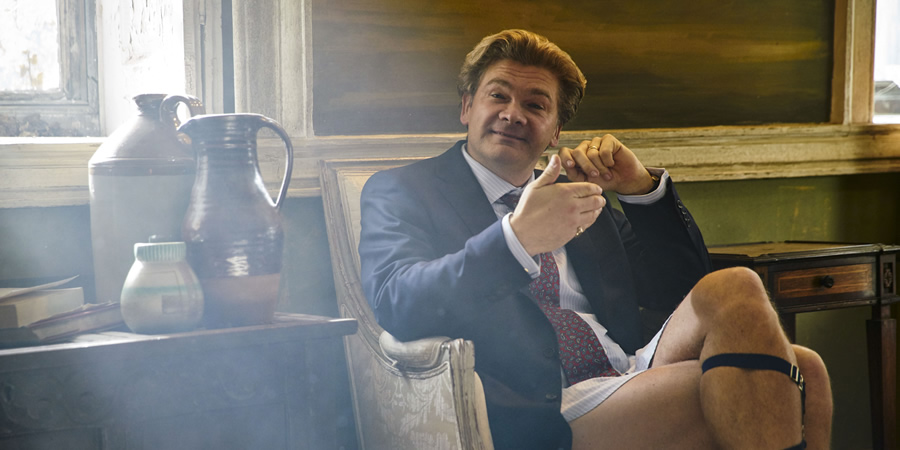
Jim: I suppose there's a part of each ghost within us, subconsciously.
Mathew: Who's that most offensive to?
Simon: Martha!
Laurence: Probably me! I think that's a thing we've found in everything we've done to a degree. You start writing a character and within a few lines you kind of have an idea in your head of who it might be for. Normally when we compare notes we've all reached the same conclusion. Then, with any leftover, we have to work out who's best to play them. Or sometimes when there's three characters there and they all feel like Simon, for example, so you have to give one of them to someone else and work out how that will work.
Mathew: We were thinking along the lines of classic, archetypal ghost figures, but also what was coming very easily was lots of more surprising ones, modern ones, like Jim's and Simon's. But it felt good to have the real classic ones in there, like Martha's - the Edwardian matriarch. In the same way, having the headless one: it felt like we had to have enough of those clear archetypes to allow for the others.
As Jim said, there's a bit of us in all of them, mine's a bit of a prick! The failed songwriter in me is very much there as Thomas the failed poet.
Is one of the ghosts the leader?
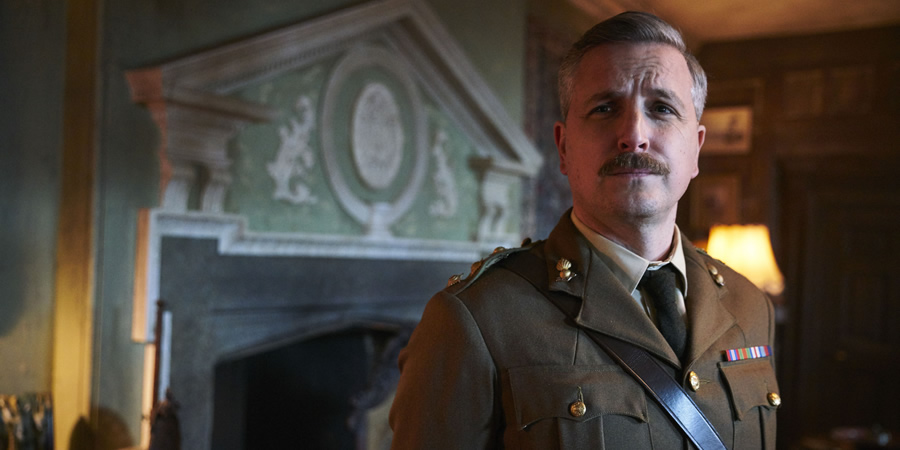
Ben: The Captain thinks that he is the leader because he's a military man. But he's absolutely not in charge. He thinks he is, but he's not.
Mathew: One of the themes of the show is that it's all about antagonism. You don't want just one high-status character, you want two or three to clash. Lady Button is also a leader in a way, she's a guardian of the high-status family line.
Jim: And then you have Robin, who is the joker of the pack. He has been there the longest so it gives him a sort of status over everyone, but then sometimes he just doesn't care.
Laurence: He's realised that nothing matters. We did think it was funny that whenever you see a ghost, they're from the 1500s up to World War Two. They are never any later and never any earlier. Why do you never see a caveman? So we thought we'd have a caveman. If ghosts are a thing, why does it always start around 1490? We thought we'd have one that's been knocking around for thousands of years.
How the caveman speaks is interesting...
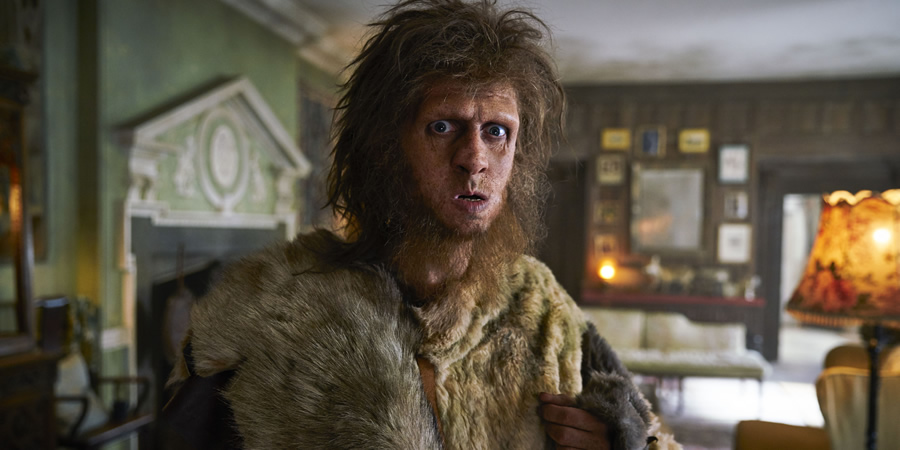
Laurence: The rationale we have for it, is over the years the caveman has seen so many things that he's actually incredibly knowledgeable but the speech section of his brain has never fully developed. He sees a lot but has trouble articulating himself so he's like an old wise sage, but almost put through the filter of a dog!
He can't quite articulate what he wants to say, which he finds frustrating - that informs his character as well. In some ways he's very wise and thoughtful, but then he'll attack! You can take the boy out of the cave, but...
Is there physical comedy in this?
Laurence: There's very physical comedy in the episode where you see how Jim met his demise. There's some great stuff there.
Jim: My character was shot through the neck by one of the boys in his adventure group. He has to struggle and get to the minivan, but he doesn't make it and dies on the grounds.
Mathew: It is a comedy, we promise!
Jim: It's the only flashback we see of one of the ghosts' demise, but we do learn about others. With Martha's character, we learn about her death in the first episode. We learn about Mary's death as well. Mary is played by Katy Wix and she was burnt at the stake.
Simon: With the physical stuff there is a different dimension as well, because we can go through walls and look into rooms that you wouldn't ordinarily be able to.
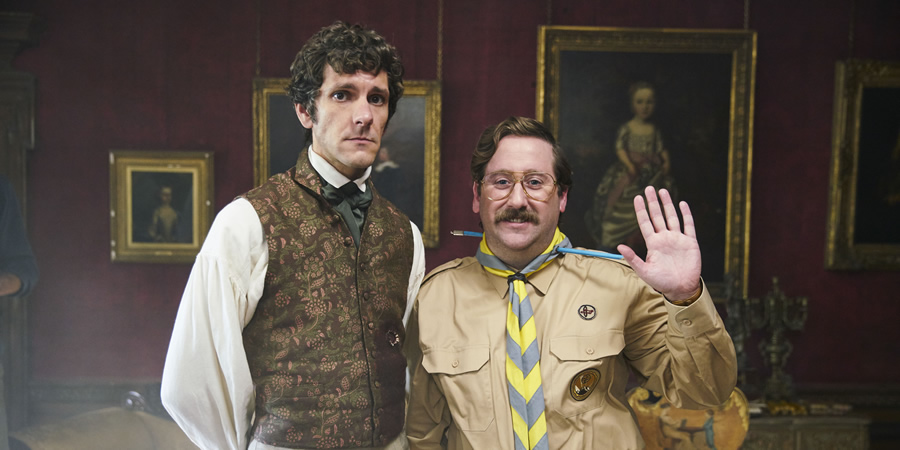
Mathew: One of the most fun things was discovering a language that's really unique to this show that we could play with. That involved cutting between the perspectives of seeing and hearing the ghosts in the room, and the physical plane in which they don't exist and you can't hear them. You can play with that language.
You'd have scenes where Alison is dealing with having a couple of ghosts behind her and she physically responds to that - and then you see it from the perspective of a living person who can't see who she's talking to, she's just shouted at empty space! She then has to find a way to make herself seem remotely sane and cover those moments and that language begins in Episode 1.
Simon: You can invade people's space if you are a ghost, there's no reason why you can't get in somebody's face. They can't see it!
Laurence: It's a real trial for some of the actors!
Mathew: The guy playing Toby Nightingale [Rory Fleck Byrne] - he had to try and do that scene again and again with me shouting in his face.
Martha: Sophie [Thompson] was asking, "Martha can I see you?" "No, no I can't see you!" They're all written into the script but the reality is that you can play the scenes entirely with the ghosts in the room and entirely without - and then there's freedom in the edit to play with that.
Mathew: Charlotte [Ritchie]'s been incredible. She's held in her head everything that she's done when we're around... and then we all clear off she has to retain everything we've done and play it again.
Laurence: It's brilliant. It's also so weird to watch. She pauses in the middle of sentences and looks at things that aren't there.
Ben: She's brilliant.
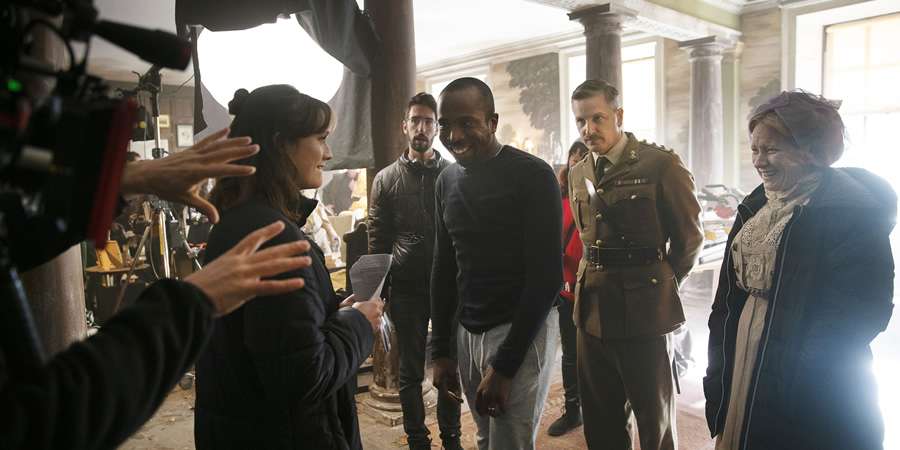
What's happening across the whole series? Is Alison trying to help them to escape?
Laurence: Yep that's the logic - if your house is haunted, you either need to get rid of the ghosts or you need to get out of the house. But it quickly becomes apparent that neither of those things are options and it's making the best of a bad situation. There are two things pulling on her: one of them is this house that she's now stuck with, she's trying to make a success of it, but also trying to come to terms with the fact that she's got to share her house with some really difficult idiots that only she can see and her husband can't.
She's put in an impossible situation and the series is about her trying to muddle her way through that new reality.
Tonally, how would you say this differs from Horrible Histories? Is it Horrible Histories for grown-ups?
Mathew: I don't think so. To some extent there is common ground in the sense that there is a comic tone and the characters are from history, but beyond that it's not a sketch show, it's not aiming to educate in any way.
Laurence: That's the thing with Horrible Histories - as performers we were always fighting against the facts in a way, we could sell the facts if we did something ridiculous enough around it... So the things we've done since then have always been free of that constraint.
Mathew: It's also, I think, the most grown up thing we've done, in the sense that we've matured and we find this funny... there's an edge of darkness to it. There are bits that are a little bit spooky and a little bit scary. We've allowed ourselves a little more cheek than that you are restricted to in a pre-watershed slot. The kids who are watching Horrible Histories, at least the first time around, now they are all grown up - hopefully we're making something so they can continue to watch us!
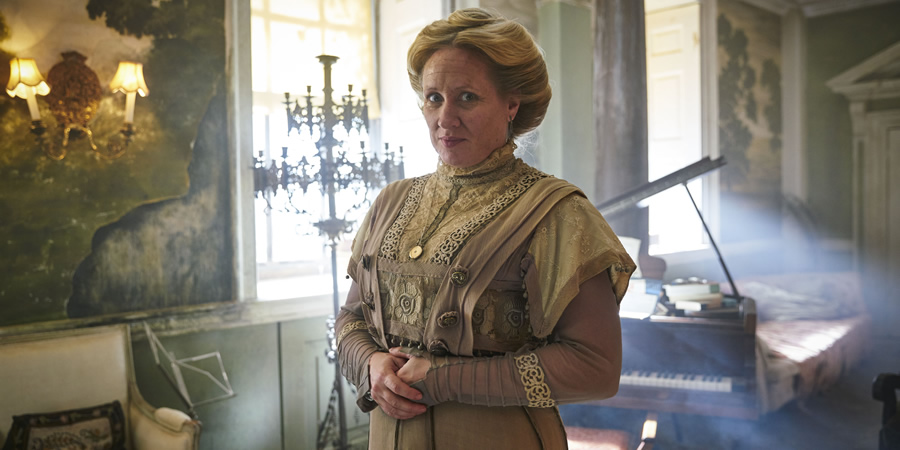
Is it a family show?
Jim: I think so.
Laurence: We were talking about the things we loved when we were growing up and often they were things like Blackadder and things that were around before the division between kids and grown-up content existed. I watched Blackadder and so did my parents. Sometime in the 90s comedy became something that adults watched at 10pm and there were children's shows that children watched. It was a split - and it never really came back together again. Or it was things that were slightly cheeky but... I've got a vivid image of watching Life Of Brian though the rippled glass of my parents' 1980s living room door. I wasn't supposed to be watching it! There's a little bit of that.
Simon: I wasn't supposed to watch it either!
Mathew: I'd love to think it's the sort of show that people will let their kids stay up a bit later for. I'd like for it to feel like it's a bit of a treat to allow them to watch it.
Laurence: The fact that we're doing something for BBC One - we don't feel like we've been pushed into a corner, this is the tone of what we're doing and this is what we want to be doing.
Mathew: There's been lots of times filming this when we've been saying to each other, 'BBC One actually want this!' We don't feel at any point that there's been any pressure to make it any less distinctive. I'd say that it takes up some of the tone of Yonderland possibly more than Horrible Histories. It has a kind of clash of surrealism as well as the broader, more accessible sense of adventure.
How many of the ghosts are products of their time and do they jar against each other?
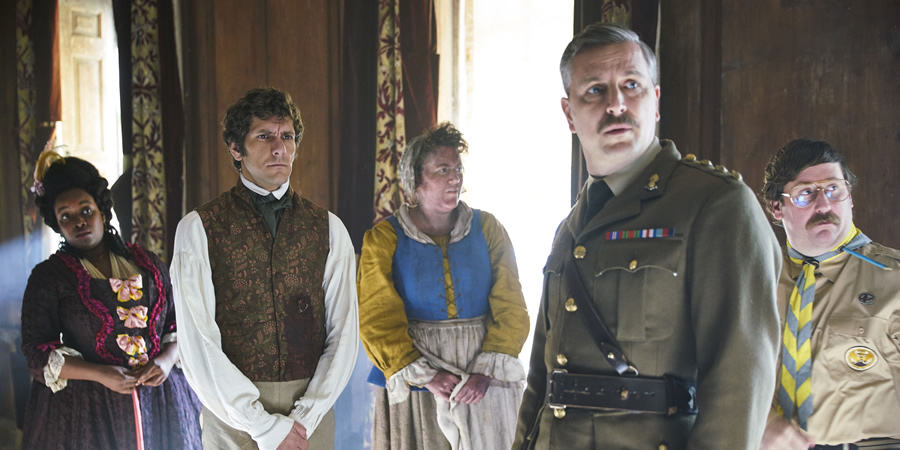
Jim: The pop culture of my character, for example, who died in the 80s... it gives you a nice window into the time. It allows him to introduce things like pop music.
Ben: He probably had an early Walkman, but now he sees they've got iPhones. The internet blows all of their minds!
Laurence: They say leopards don't change their spots, and to an extent that's true. Your moral compass and everything is set in the time you're growing up and the time in which you're born. It's been so fun to write because you've got people with completely different ideas of what is and what isn't acceptable.
Jim: For some of them, life is cheap. The idea that you can solve a problem by killing someone, for some of them, is perfectly acceptable.
Laurence: The caveman's first suggestion to most problems is to kill them.
Simon: There are interesting clashes.
Mathew: Ghosts can pass on, but they don't know how or why. They also don't know why they are stuck there. It's a metaphor for life really. We're stuck here, we don't know why, and what do I do to fill my time? Instead of thinking, well it could be centuries, so I could learn every language and read every great work of literature, they still approach it day by day.
Jim: It allows us to have a jeopardy too.
Mathew: We're all aware that we could die tomorrow, but does that mean that I live every day as if it could be my last? No. None of us do.
Ben: I do! I've just bought a sports car.
Martha: That's a mid-life crisis.
Do you have a lot of ghosts that you had to discard?
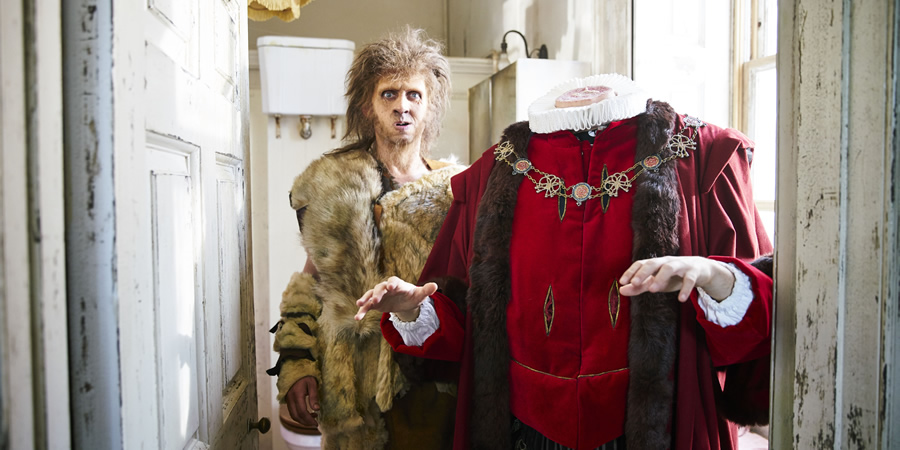
Mathew: Some of them were folded into characters that we've got. There was an idea early on that the wisest ghost in the house would be a six year-old child, because she'd been there for centuries, and they'd all find it really creepy going to ask her for advice - and for a number of reasons, that's unpractical.
Simon: Martha and I played a couple where I had killed her and then killed myself. Then of course, in that scenario you both end up as ghosts and then you think, great - now I'm stuck with her.
All: She killed you!
Mathew: The whole thing was, they were a couple that hated each other and to escape the marriage she killed him but then immediately died by accident and therefore ended up stuck with him for eternity.
Simon: So that went, for obvious reasons.
What would you say is so funny/interesting about exploring the afterlife?
Mathew: I've really enjoyed it in a metaphorical sense, it's actually a way to talk about existing.
Laurence: We're almost the antithesis of that in the show. Rather than saying there's an afterlife - a place you go on to - we're saying there's not, and you're stuck! You end up doing exactly what you had to do again, in the last place you were when you were alive. You're back there and now you're stuck with it. It's more like a purgatory than an afterlife.
We've got these white-light moments when the ghosts pass over, and the feeling from the other ghosts is just real petty jealousy. In the same way we do, when someone dies you mourn them and to a certain degree you think about where they are and what they're doing, if there is anything. In the show, that big bright light is that annoying thing and that lucky get-out. It just makes the ghosts more angry.
Simon: My favourite scenes are the ones where they're arguing over really tiny things that become so important because that's all they've got.
Jim: Julian can just about touch stuff, Larry's character Robin can affect the lights and Mary can omit a smell. So we do have a very very small practical effect on the world, but we try to use the skills in a haunting in the first episode which doesn't work.
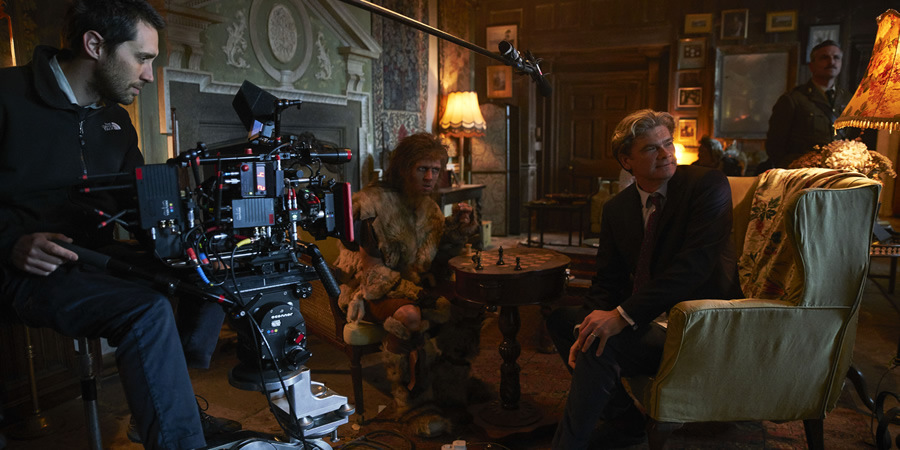
Will you take the ghosts outside the house or would that destroy them?
Mathew: That's against the rules.
Jim: We can go as far as the drive, because my character didn't die in the house, he died on the grounds, and Mat's character died on the grounds as well.
Laurence: In the very early stages of developing we sat down and went, okay - what are ghosts and how do they work in terms of stories? It's saying, this place is haunted because someone died here and for some reason there's this geographical link which means people stay where they die.
When you have individual projects, how does it all work together as a group?
Laurence: It gets increasingly difficult. We try to carve out two or three-month periods where we can all be together, because it's still really enjoyable, it's like a homecoming.
Simon: We have days where we get down and throw as many ideas out as we can - usually we're all around for those.
Mathew: So far, we've all continued to want to work together.
Which characters are you most recognised for still?
Mathew: The thing about Horrible Histories, we were every version of ourselves we could be - long beards, short beards, no beards, moustache. You can't present yourself in any way that you're not going to get recognised for it.
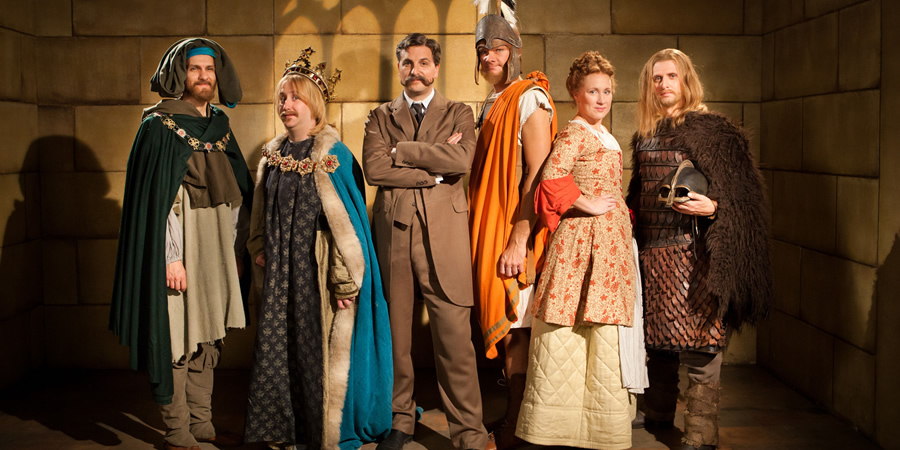
Do you guys miss it at all?
Laurence: It was such a joy. We're six very different people but we've all got the same sense of humour and always made each other laugh. We would get in the car at the end of the day and our faces hurt from laughing, and that doesn't happen on other jobs.
We all get to work on fun exciting things and we're very lucky to be in the careers we're in, but there's something different about this, and the reason we started to develop Yonderland and Bill was we were always terrified that the thing we were doing would be the last chance to work together and we tried to avoid it - so far!
You started on CBBC and now this is your big BBC One show. People have been comparing you to them for years, but is this your big Monty Python moment?
Ben: It would lovely if it was!
Mathew: There is a crossover but our history is different to them - we didn't come through together through university and that sort of thing. It makes me nervous being compared to them, you know!
Laurence: When we sit down and talk about things that make us laugh that's one of them, but there are a thousand other shows, a million other YouTube clips or people you pass in the street who've just got a funny voice, there are so many influences and that's just one of them.
Mathew: The reason it probably keeps coming up is because there aren't gangs any more. Python was the most famous iteration of that era of comedy troops, and since The League Of Gentlemen there haven't been many groups. The audience enjoys it, it's the fun of seeing the same people in different guises every time you watch a new thing - we've all had that as fans of Python and League.
Laurence: We could not have been more diligent in trying to make the best show we possibly can.
Mathew: All you can do is make a show that you're proud of. So far that's what's happened and our approach is no different now, thinking that there's a big audience who can watch it. It hasn't affected how we've approached the writing process at all.
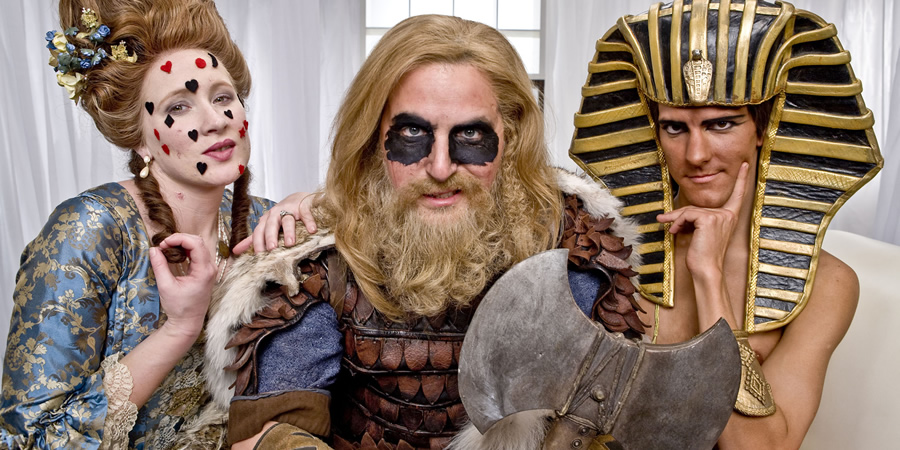
Would you ever do a pure sketch show?
Mathew: The Venn diagram of all our particular tastes has this spot in the middle where they cross over. Working on sketches, because they're nuggets and individual ideas, you don't really get to explore that space.
Instead of making a virtue of this melting pot of our different tastes, a sketch show feels like it would be tonally uneven - and all over the place - because it would feel like three different sketch shows of three different sensibilities.
Sketch shows that work tend to be ones that have a really good sort of identity, some sort of over overarching reason to exist beyond, 'here's a sketch show from these two people'. With Python, you always think of the animations and the fact that they make much out of how you link to sketches. Horrible Histories had a reason, it had such a clear identity, it had themes. We never found a reason for us to make a sketch show outside of Horrible Histories.
Simon: We've come to enjoy working on narrative and structure, things that lend themselves to some emotion and poignancy, and it's really hard to get that in a sketch show because it's all about the laughs. In this we've got death and we've got bits here and there where you get a bit of emotion.
Help us publish more great content by becoming a BCG Supporter. You'll be backing our mission to champion, celebrate and promote British comedy in all its forms: past, present and future.
We understand times are tough, but if you believe in the power of laughter we'd be honoured to have you join us. Advertising doesn't cover our costs, so every single donation matters and is put to good use. Thank you.
Love comedy? Find out more
